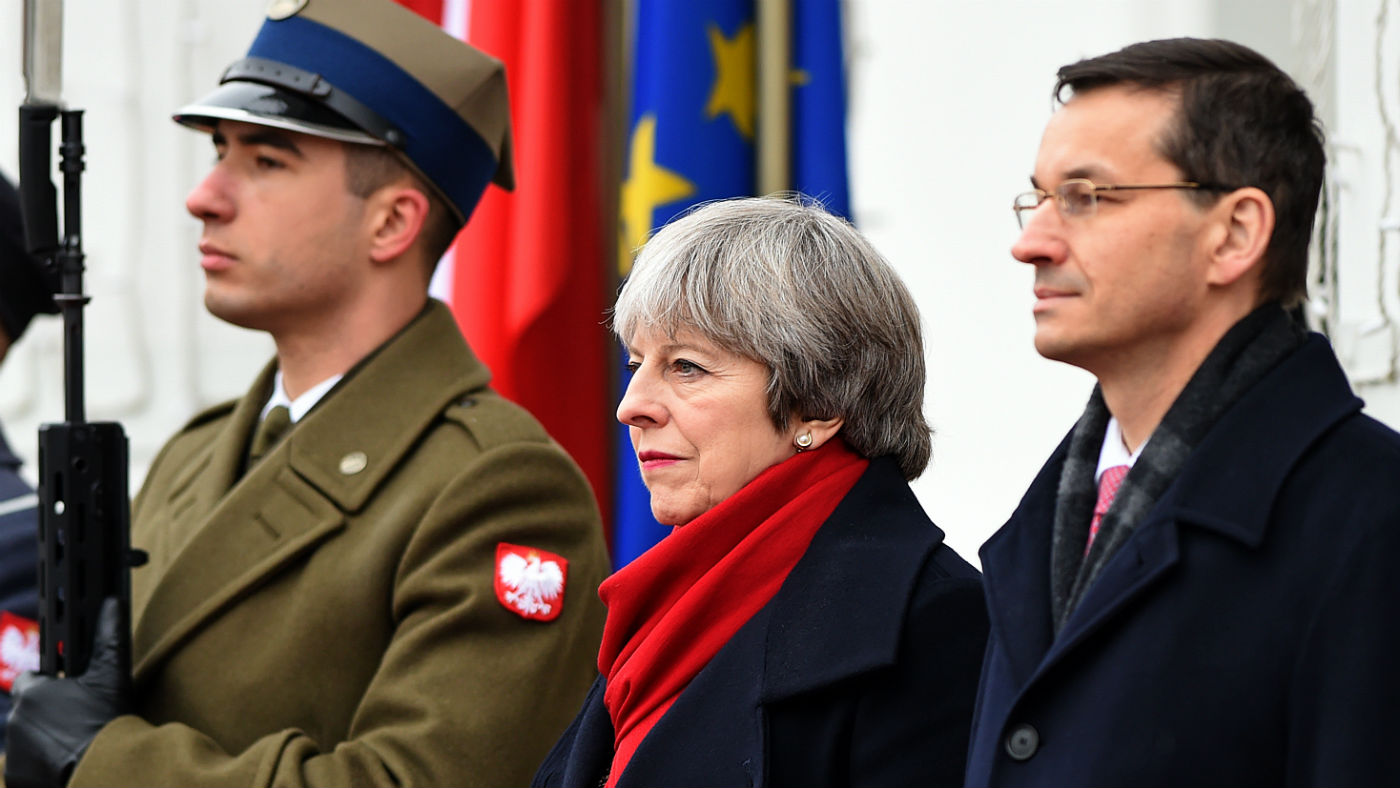Are post-Brexit Britain’s morals for sale?
The UK is strengthening ties with Poland and other authoritarian regimes

A free daily email with the biggest news stories of the day – and the best features from TheWeek.com
You are now subscribed
Your newsletter sign-up was successful
During a visit to Warsaw, Theresa May has “refused to condemn Poland’s slide into authoritarianism”, says The Independent, prompting accusations that post-Brexit Britain is willing to sacrifice its global moral standing in order to win friends abroad.
The Prime Minister spoke up for respecting the rule of law, but said recent changes to the country’s constitution, the state takeover of television news and attempts by the ruling Law and Justice Party to stuff courts with political appointees, including tribunals that will decide the validity of election results, were its own business.
“These constitutional issues are normally, and should be primarily a matter for the individual country concerned,” she said, standing next to Polish Prime Minister Mateusz Morawiecki. “Across Europe we have collective belief in the rule of law.”
The Week
Escape your echo chamber. Get the facts behind the news, plus analysis from multiple perspectives.

Sign up for The Week's Free Newsletters
From our morning news briefing to a weekly Good News Newsletter, get the best of The Week delivered directly to your inbox.
From our morning news briefing to a weekly Good News Newsletter, get the best of The Week delivered directly to your inbox.
She went on to hail the special relationship between the UK and Poland, which she said was “based on a shared history and a shared tradition”.
Her response was in stark contrast to that of the EU, which has started a legal process that could suspend Poland’s voting rights on the Council of Ministers and withold funding to the country.
The threat to make Poland a pariah in the EU family “comes at a highly embarrassing moment for May”, who could face an acid test of her loyalties if the UK is forced to vote on censuring Poland in the European Council, says The Daily Telegraph.
While it is a keen advocate of independent judicial systems, “the British government also wants to build alliances as it attempts to win support for May’s pursuit of a ‘deep and special’ trade deal with the EU”, says The Guardian.
A free daily email with the biggest news stories of the day – and the best features from TheWeek.com
The Prime Minister’s willingness to court rather than condemn the increasingly authoritarian regime is part of a broader change in British foreign policy in the wake of Brexit.
Since taking office last year, May and senior members of her government have been on a global charm offensive, trying to prepare the ground for new trade deals.
During a recent trip to the Middle East, the Prime Minister refused to condemn publicly Saudi Arabia’s human rights record - although she has since criticised its blockade of Yemen. International Development Secretary Liam Fox has spent much of the last year cosying up to some of the world’s most authoritarian regimes, including Egypt, Turkey, Bahrain and the Philippines.
In a bid to fulfil the Brexiteer dream of a “truly global Britain”, says Labour MP Lloyd Russell-Moyle in The Guardian, the Government has prioritised arms sales for Britain’s post-Brexit industrial policy, “believing that by exporting arms, Britain can somehow project power”.
Fox’s department - which licences Britain’s exports of guns, planes and bombs - has overseen a sharp spike in sales to repressive regimes, many of which it has identified as “priority markets”. The biggest of these is Saudi Arabia, which is leading a coalition which, according to the UN, has killed more than 5,000 civilians in Yemen.
-
 Political cartoons for February 16
Political cartoons for February 16Cartoons Monday’s political cartoons include President's Day, a valentine from the Epstein files, and more
-
 Regent Hong Kong: a tranquil haven with a prime waterfront spot
Regent Hong Kong: a tranquil haven with a prime waterfront spotThe Week Recommends The trendy hotel recently underwent an extensive two-year revamp
-
 The problem with diagnosing profound autism
The problem with diagnosing profound autismThe Explainer Experts are reconsidering the idea of autism as a spectrum, which could impact diagnoses and policy making for the condition
-
 How corrupt is the UK?
How corrupt is the UK?The Explainer Decline in standards ‘risks becoming a defining feature of our political culture’ as Britain falls to lowest ever score on global index
-
 The high street: Britain’s next political battleground?
The high street: Britain’s next political battleground?In the Spotlight Mass closure of shops and influx of organised crime are fuelling voter anger, and offer an opening for Reform UK
-
 Is a Reform-Tory pact becoming more likely?
Is a Reform-Tory pact becoming more likely?Today’s Big Question Nigel Farage’s party is ahead in the polls but still falls well short of a Commons majority, while Conservatives are still losing MPs to Reform
-
 Taking the low road: why the SNP is still standing strong
Taking the low road: why the SNP is still standing strongTalking Point Party is on track for a fifth consecutive victory in May’s Holyrood election, despite controversies and plummeting support
-
 Russia: already at war with Europe?
Russia: already at war with Europe?Talking Point As Kremlin begins ‘cranking up attacks’ on Ukraine’s European allies, questions about future action remain unanswered
-
 ‘Peak consumption has become the Holy Grail of the energy debate’
‘Peak consumption has become the Holy Grail of the energy debate’Instant Opinion Opinion, comment and editorials of the day
-
 What difference will the 'historic' UK-Germany treaty make?
What difference will the 'historic' UK-Germany treaty make?Today's Big Question Europe's two biggest economies sign first treaty since WWII, underscoring 'triangle alliance' with France amid growing Russian threat and US distance
-
 Is the G7 still relevant?
Is the G7 still relevant?Talking Point Donald Trump's early departure cast a shadow over this week's meeting of the world's major democracies